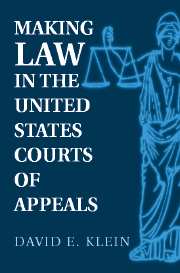Book contents
- Frontmatter
- Contents
- List of Tables
- Acknowledgments
- 1 Law Making in a Hierarchical Judicial System
- 2 Theory and Hypotheses
- 3 The Cases
- 4 Influences on Circuit Judges' Responses: Case Evidence
- 5 Influences on Circuit Judges' Responses: Interview Evidence
- 6 Anticipating the Supreme Court
- 7 Implications and Future Directions
- Appendixes
- References
- Index
5 - Influences on Circuit Judges' Responses: Interview Evidence
Published online by Cambridge University Press: 10 December 2009
- Frontmatter
- Contents
- List of Tables
- Acknowledgments
- 1 Law Making in a Hierarchical Judicial System
- 2 Theory and Hypotheses
- 3 The Cases
- 4 Influences on Circuit Judges' Responses: Case Evidence
- 5 Influences on Circuit Judges' Responses: Interview Evidence
- 6 Anticipating the Supreme Court
- 7 Implications and Future Directions
- Appendixes
- References
- Index
Summary
This chapter builds on the preceding one, returning to the interviews to see what light they can shed on circuit judges' decisions to follow or reject new legal rules created by their colleagues. The case analysis provided strong support for the hypotheses, but it could not establish anything with certainty. As already discussed at length, the measures were imperfect. Furthermore, in a statistical analysis, there is always the chance that the relationships uncovered hold only for the cases included, not for the entire population from which they were drawn. The interviews allow us to probe the hypotheses using different methods from a different set of observations. If the results agree, our confidence in them will be enhanced.
Unfortunately, not all of the hypotheses were adequately covered in the interviews. This was partly because of limitations inherent in the method and partly because the interviews took place early in the life of the project, before the full set of hypotheses was developed. As compensation, the interviews go beyond the cases in important ways, contributing additional detail and answering questions the quantitative analysis could not address. In this way they point to other possible influences on rule adoption and aid in the interpretation of ambiguous results from the quantitative analysis. In the interest of narrative flow, I will present all connected ideas together, rather than discuss separately those comments pertaining directly to the hypotheses.
I did not ask the judges any direct question about the impact of policy preferences (H1). It was difficult to see how the question could be framed without offending some judges, but, more important, it would have been superfluous.
- Type
- Chapter
- Information
- Making Law in the United States Courts of Appeals , pp. 87 - 106Publisher: Cambridge University PressPrint publication year: 2002



